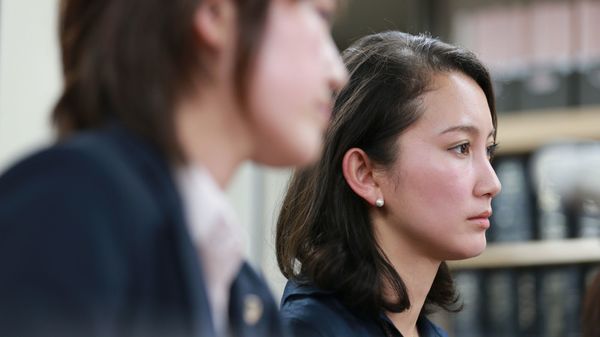Eye For Film >> Movies >> Black Box Diaries (2024) Film Review
Black Box Diaries
Reviewed by: Amber Wilkinson

Documentaries don’t get much more personal or intimate than this one, as Japanese journalist Shiori Ito bravely - although this adjective is extremely loaded - points the camera at herself as she tries to get justice after being raped. The result, which rightfully begins with a trigger warning, is a raw consideration of the legal and societal barriers that lay in the way of Ito’s goal.
The film foregrounds the evidence. A car ride with the taxi driver who took her to the hotel where she was attacked on the night in question sees him admit that she wanted to be dropped off at the station but was repeatedly overruled by her attacker, fellow journalist Noriyuki Yamaguchi. The driver also notes she was barely able to stand and had to be lifted from the car - evidence that we see play out before us on CCTV footage.
The tacit enablement of both the cab driver and the hotel valet is just the start of Ito’s nightmare. Japan’s rape laws at the time were 100 years old and required evidence of physical abuse, such as a beating, to stick. The age of consent was, at the time Ito was raped, 13 although it has since been raised to 16.
From the start, her family try to dissuade her from coming forward over fears she will be stigmatised - a concern borne out in much of the subsequent reaction, although there are also those who stand in solidarity with her. Ito records all of her feelings via video diaries, which show her pushed to the brink. Beyond Japan’s outdated laws, she also has to contend with a political dimension as Yamaguchi was a close associate and biographer of then-prime minister Shinzo Abe.
The film is made with hindsight, following on from a book that Ito also wrote on the subject, the framing of it indicating how this traumatic event changed her life in multiple ways forever. However, she also keeps us in the individual moments she experienced, so that the impact is raw and immediate. Ema Ryan Yamazaki’s editing is also a crucial factor, as it helps us to follow the emotional ebb and flow of Ito’s experience, from the self-possessed moments of determination to desperation and back again. We are her confidantes in a world which, at the time she was fighting for justice, she was largely navigating alone.
Although specifically hampered by the Japanese system, and a testimony to all the journalist has achieved in terms of change to it, Ito’s film also stands in solidarity with survivors everywhere who are striving for justice and paying a cost for that which should really be felt by the perpetrators.
Reviewed on: 25 Oct 2024















